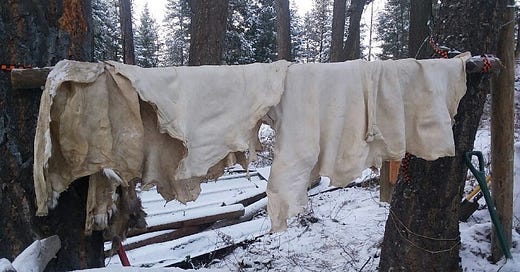“If we love anyone, we will grieve them when they die—and it will be harder, and last longer, than we ever expected.” —Mark Liebenow
One of the newsletters I subscribe to (Zeynep Tufekci’s “Insight”) had a subscribers-only piece about the vaccine rollouts the other day, and I kept trying to prod my brain into at least fully, attentively reading the piece even if I couldn’t think of anything to say about it. But I couldn’t muster the attention because I was giving most of it to what almost everyone else was giving attention to that day.
Even when I can’t engage with Covid-19 news, though, there is one thing that brings its reality home to me every single day, and that’s the obituary section of my local paper.
Not everyone in there has passed away from Covid, and even if they have it often won’t specify (I assume that’s up to the family), but there is no denying the reality that for well over two months now that section has been longer than it was six months ago. Sometimes it stretches over two pages, which might not seem like a lot, but I do live in northwest Montana, not in a city of millions (the entire state barely has over a million people).
By chance on one of the days when the obituary section seemed even longer than usual and included two people in their thirties, I received Mark Liebenow’s newsletter—Mark writes beautifully about grief and being a widower and was one of the people whose feeds made Twitter a more human place to be when I had an account there. It included a link to his short essay “The Landscape of Grief,” and provides some direction that many might need right now but don’t know how to find.
Many of my friends have lost someone over this past year, some to Covid and some to other causes, and the inability to gather and share the grief has felt an added source of pain. It’s hard to know what to do with the enormity of grief and the need to help when physical contact is impossible. All I can think of is advice a friend gave years ago when talking about her bout with cancer: Don’t disappear.
But I wish I could be there to grieve with everyone. I wish we all could. I should have said this in my post on the attempted coup and embodied trauma, but I hope that throughout this—throughout life—you are able to pause and take stock of how fear, anger, worry, tension, and all the grief, all of it, affects your body, and how you can care for yourself.
—-
Some stuff to read or listen to:
In the midst of miring myself in Twitter during the attempted coup this week, I came across this bizarre story of someone in Oregon who light-heartedly tried to train some crows while they were furloughed and ended up with a semi-violent crow army. If you need something else to think about, diving into the Reddit thread of advice in response to the problem was probably the best use of five frivolous minutes I made all week (that’s not saying much). I think my favorite part is that it’s posted in a forum for legal advice because the poster wasn’t sure about liability if the crows attack someone.
This piece by anthropologist Gideon Lasco on rediscovering the rewarding rituals of making and consuming coffee during a pandemic, published in Sapiens, is a pleasant reminder of the small joys we look forward to whether the world is storm-tossed or calm. (Also, if you read it and are interested in the Cup of Excellence competition mentioned at the end, it’s actually a great organization that has helped many small family coffee farmers by rewarding them for quality coffee [several of my family members work in specialty coffee, and my father has served as a judge for Cup of Excellence in the past]).
Also in Sapiens, anthropologist Julianne Yip on new technical approaches to saving Arctic sea ice, and her advice that anyone attempting to do so should first start thinking of the ice—and nature in general—as a partner, rather than as an inert object that humans can manipulate at will: “Focusing on levers can lead people into a technical trap, whereby a complex problem is falsely reframed as a simpler, technical one just to make it tractable.”
Also on the subject of partnership, Rianne Eisler, a Holocaust survivor and author of the now-classic The Chalice and the Blade, on Douglas Rushkoff’s Team Human podcast talking about her new book Nurturing Our Humanity.





Some great links - such a wide variety! - the crows were fascinating. I am going to try that :-).
Thanks, another thoughtful column, you last paragraph really resonated with me. We are here a short time, then gone forever. Take care of ourselves, be thankful for everything, and take care of ourselves and others.